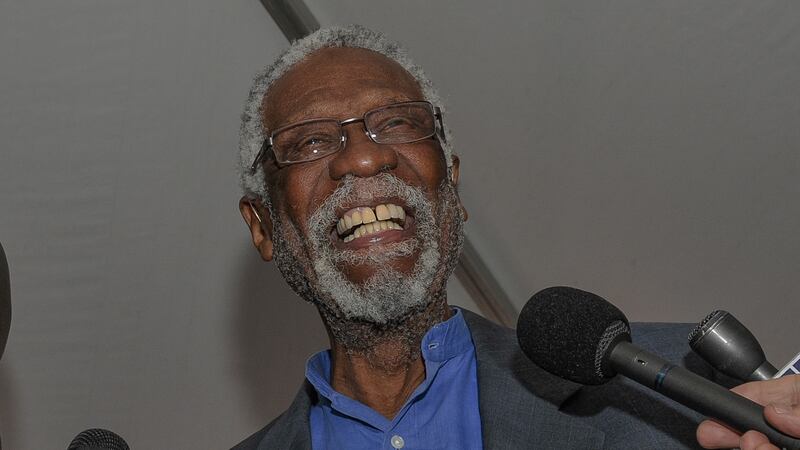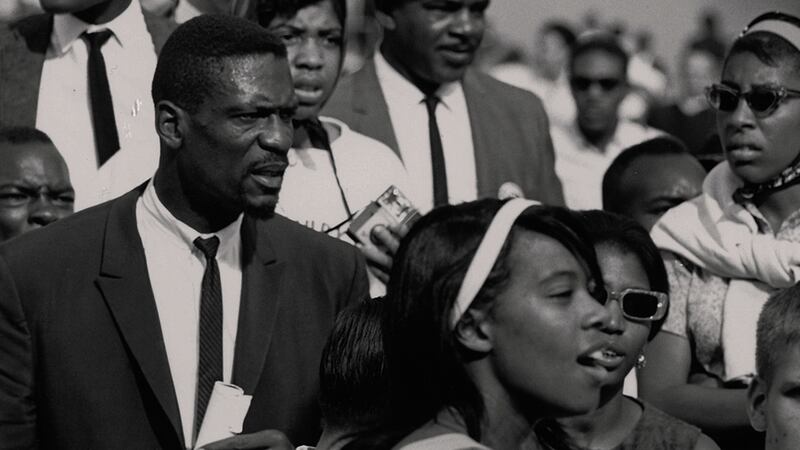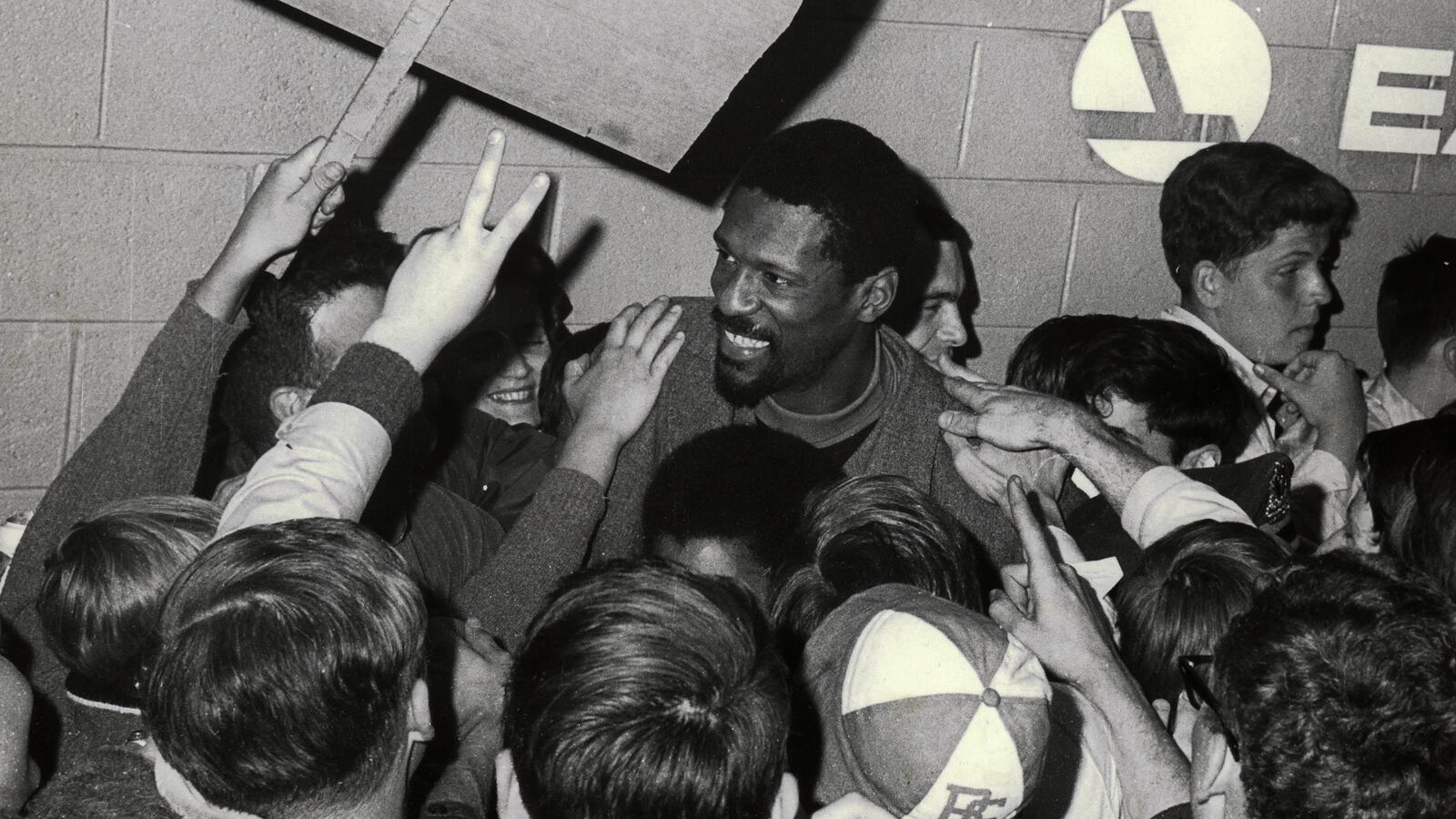Bill Russell is the greatest winner in the history of American professional sports. Over the course of his 13-year career with the Boston Celtics, the 6-foot-10-inch center won 11 championships, the last two of which were earned while he was serving as both player and head coach. He also netted two national titles, one Olympic gold medal, five NBA MVP awards, and 12 NBA All-Star honors. Renowned for his rebounding, shot-blocking, and all-around defensive prowess, he’s so synonymous with NBA success that the league’s Finals MVP award is now named after him.
That legacy is part of the reason why so many illustrious basketball stars, past and present, are featured in Bill Russell: Legend. However, as conveyed by this two-part Netflix documentary from director Sam Pollard (MLK/FBI, Citizen Ashe), they also participate because Russell was more than just a superlative player—he was a fervent civil rights activist who never wavered from who he was or what he believed in, and who bravely used his platform to help further the cause of equality for Black Americans.
Narrated by Corey Stoll, Bill Russell: Legend (Feb. 8) won’t be an enjoyable history lesson for Los Angeles and Philadelphia basketball fans, whose teams—often led by Wilt Chamberlain, Russell’s long-time professional nemesis—routinely fell to Russell’s Boston Celtics during his dynastic 1956-1969 career. Beantown viewers, on the other hand, will find much to love about this comprehensive non-fiction portrait, which paints a picture of a life defined, on and off the court, by staunch conviction. Disinterested in kowtowing to the expectations of others, intensely loyal to his teammates and his coach, defiant in the face of prejudice aimed at himself and his countrymen, and committed to doing what’s right no matter the arena, Russell was, as Larry Bird succinctly puts it, “a stand-up man” in every respect.
Guided by a who’s who of talking heads (including Bob Cousy, Magic Johnson, Steph Curry, Earl “The Pearl” Monroe, Jerry West, Walt Frazier, Bill Bradley, Shaquille O’Neal, Jayson Tatum, and more), and enlivened by a stunning array of archival material, Bill Russell: Legend charts Russell’s rise to prominence, which began in the segregated Jim Crow community of Monroe, Louisiana. Unwilling to continue tolerating hateful discrimination, Russell’s father relocated his clan to Oakland, where Russell—courtesy of his mother—developed a voracious appetite for the illuminating books available at the public library. Pollard’s docuseries reveals that, from an early age, Russell boasted a fierce intellectual curiosity and artistic sensibility, and he immensely benefited from proud parents who taught him to always work hard and stay true to himself.

Strengthened by those values, Russell grew from an ungainly kid into a promising basketball player who, at the University of San Francisco, blossomed into a phenom, leading the school to back-to-back national championships. When the NBA beckoned, Boston Celtics coach Arnold “Red” Auerbach pulled off an amazing draft swindle (involving the Ice Capades!) to secure the pick that would get him Russell, whom he rightly viewed as the key to transforming the Celtics from perennial contenders into champions. Though his early days were a bit rocky (thanks to his limited offensive game), Russell quickly proved his worth with his agile and fearsome defense and rebounding, becoming the ideal complement to superstar point guard Cousy and, consequently, the missing key to the Celtics puzzle.
Russell’s towering basketball feats are recounted in Bill Russell: Legend, aided by footage of his contests and commentary from both compatriots and Russell himself—courtesy of old interviews as well as passages from his memoirs read by Jeffrey Wright. Still, the series isn’t just a straightforward clips package. Director Pollard consistently draws links between Russell’s hardcourt play and his guiding desire to prioritize team triumph over individual accomplishments. Through cannily edited sequences, he demonstrates the many ways, big and small, that Russell put his selfless ethos into practice—an attitude that habitually led to victory over his opponents, most notably Chamberlain, who was the me-first yin to Russell’s whatever-it-takes yang.
Bill Russell: Legend imparts a deep sense of Russell as an athlete and a man who—with a big, boisterous laugh that was as genuine as his stern glares—never backed down from a fight, changed his demeanor, or stayed silent in order to please others. Faced with racist discrimination in the Boston suburb of Reading, where he and his family lived, as well as in the many NBA cities to which he traveled, Russell fought for the rights of Black Americans, famously marching with Martin Luther King Jr. and standing alongside Muhammad Ali when he opposed the Vietnam War. Slammed throughout his career for being cold, unfriendly, and “arrogant” (the last of which he proudly agreed with), Russell was defined by his principles. If those rubbed people the wrong way—such as his refusal to sign autographs, which was born out of a belief that he owed the public no more than his on-court performances—they were nonetheless what turned him into an icon of athletic accomplishment and civil rights courage.

The Russell that emerges in Bill Russell: Legend is one who loved the competitiveness and camaraderie of basketball and yet wouldn’t suppress his maturing consciousness about injustice. Pollard understands Russell from the inside out and, in the process, captures a time and era marked by various villains and heroes—be it the Boston sportswriters who made it a recurring point to downplay Russell’s role and achievements on the team (frequently in favor of praising the white Cousy), or Red Auerbach, a hard-nosed coach and general manager who stuck by Russell through thick and thin, as well as spearheaded the NBA-integration charge, fielding the first all-Black starting unit and hiring Russell as the league’s first Black coach. Auerbach is depicted as a subtle civil rights pioneer in his own right, and thus it’s no wonder that the demanding Russell affectionately embraced him as a kindred spirit.
Russell is the gold standard for sports excellence, not only because of his peerless accolades but because, as Bill Russell: Legend illustrates, he embodied the noble ideals of selflessness, togetherness, and liberty and justice for all. He was a titan on the Boston Garden’s parquet floor, and—more importantly—a shining example to which all future athletes should aspire.





